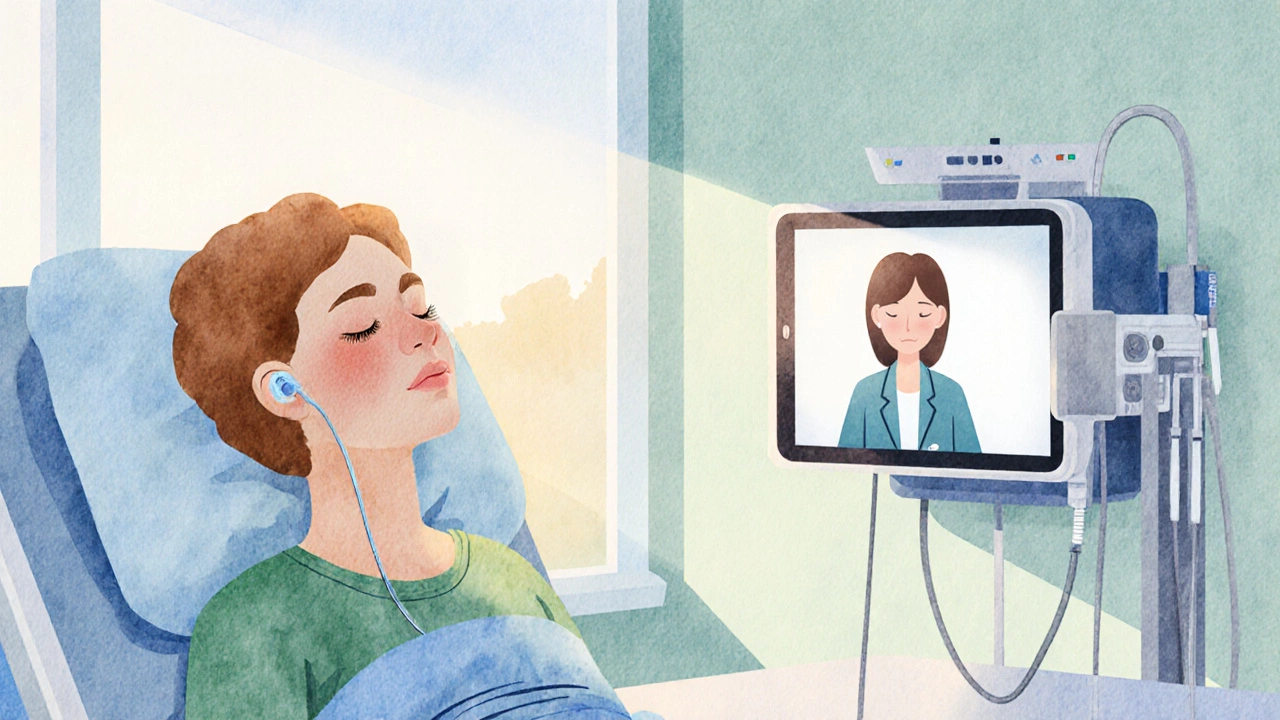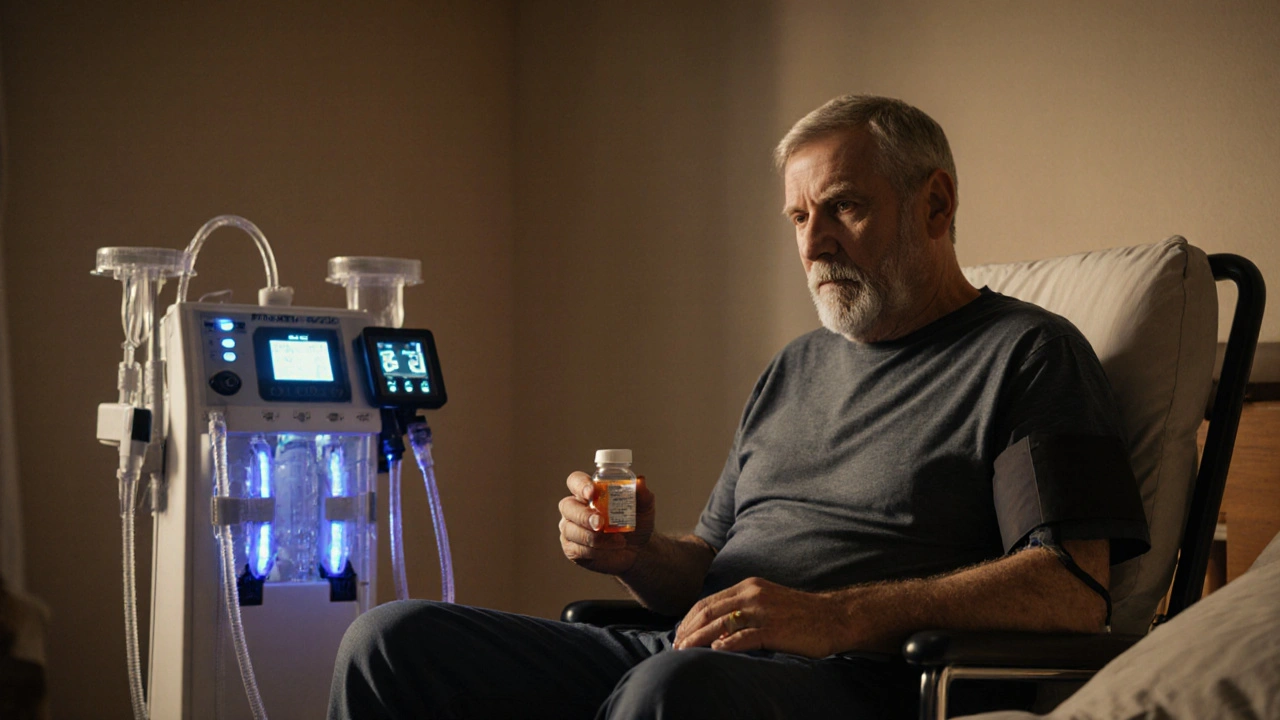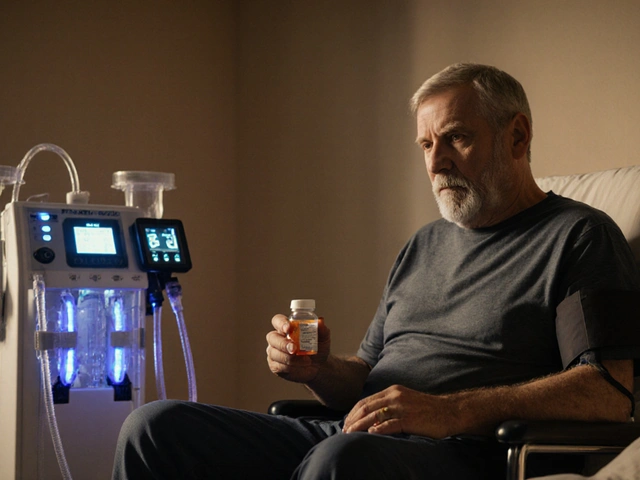Renal Failure Mental Health Screening Tool
Quick Assessment
This 9-question screening tool is based on validated clinical scales. It helps identify symptoms of depression and anxiety in patients with renal failure. Please answer honestly based on how you've felt over the past two weeks.
Your Results
Living with renal failure is a daily juggling act-fluid limits, medication schedules, and frequent appointments. Add the weight of anxiety or depression, and the whole picture can feel overwhelming. This guide breaks down why kidney disease and mental health often collide, and offers practical steps that patients, families, and clinicians can use right now.
Why kidney disease and mental health intersect
Chronic kidney disease (CKD) changes the body’s chemistry, disrupts sleep, and imposes strict lifestyle rules. Those physical stressors trigger the brain’s stress response, leading to anxiety and depression. A 2023 cohort of 1,200 dialysis patients showed that 38% screened positive for moderate‑to‑severe depression, while 45% reported clinically significant anxiety.
Two main mechanisms drive this link:
- Biological: Impaired kidneys can’t clear waste products, producing uremic toxins that affect neurotransmitters.
- Psychosocial: Uncertainty about the future, financial strain, and social isolation erode emotional resilience.
Understanding both angles helps clinicians target treatment beyond simply adjusting dialysis settings.
Spotting the warning signs early
Early detection matters because untreated anxiety or depression can worsen adherence to dialysis, medication, and diet, which in turn speeds disease progression. Look for these red flags:
| Symptom | Typical anxiety sign | Typical depression sign |
|---|---|---|
| Sleep | Difficulty falling asleep, racing thoughts | Insomnia or hypersomnia, loss of interest in sleep |
| Appetite | Loss of appetite due to worry about meals | Significant weight loss, lack of pleasure in eating |
| Energy | Restlessness, feeling on edge | Persistent fatigue, slowed movements |
| Thought patterns | Catastrophic thinking about treatment outcomes | Feelings of hopelessness, worthlessness |
| Social behavior | Avoiding appointments, constant checking | Withdrawal from friends, reduced communication |
Ask patients routine screening questions-"How often do you feel nervous or sad?"-and record responses in the health record. The PHQ‑9 and GAD‑7 are quick, validated tools that fit into a 10‑minute visit.
Medical options: Medications that work with kidneys
When anxiety or depression reaches moderate severity, medication often becomes part of the plan. However, kidney function dictates dosage and drug choice.
- Selective serotonin reuptake inhibitors (SSRIs) such as sertraline are generally safe down to an eGFR of 30ml/min. They require dose reduction below that threshold.
- Serotonin‑norepinephrine reuptake inhibitors (SNRIs) like duloxetine need caution because they can accumulate when clearance falls below 15ml/min.
- Benzodiazepines are discouraged for long‑term anxiety because they increase fall risk and can worsen sleep apnea, a common comorbidity in CKD.
Collaboration between nephrologists and psychiatrists ensures the chosen drug doesn’t clash with dialysis medications such as phosphate binders or erythropoiesis‑stimulating agents.

Therapeutic approaches that don’t involve pills
Psychotherapy, lifestyle tweaks, and peer support often deliver lasting relief with minimal side effects.
- Cognitive‑behavioral therapy (CBT): Tailored CBT modules address health‑related worry, helping patients reframe catastrophic thoughts about dialysis.
- Mindfulness‑based stress reduction (MBSR): Short, guided breathing sessions can be practiced during the waiting period before dialysis, lowering cortisol spikes.
- Exercise: Even light resistance training twice weekly improves mood scores by 30% in a 2022 randomized trial of 150 CKD patients.
- Peer groups: Kidney‑specific support circles give patients a safe space to share fears, reducing perceived isolation.
Most programs can be delivered virtually, a key advantage for patients who travel long distances for treatment.
Practical coping toolbox for daily life
Below is a quick‑reference cheat sheet patients can print and keep by the bedside.
- Morning check‑in: Rate anxiety (0‑10) and mood (0‑10). If either score is above 7, schedule a 10‑minute grounding exercise.
- Medication log: Track each dose, side effects, and blood work results. Spotting patterns helps clinicians adjust treatment.
- Nutrition reminder: Small, protein‑rich snacks (e.g., a boiled egg) keep blood sugar steady, which can curb irritability.
- Dialysis day ritual: Listen to a calming playlist or an audiobook while hooked up. Consistency trains the brain to associate the chair with relaxation.
- Emergency plan: Keep a list of crisis numbers-local mental‑health hotline, nephrology nurse line, trusted family member.
These habits may look simple, but they buffer the emotional rollercoaster that many patients describe as "the highs and lows of dialysis."
Supporting loved ones: What families can do
Family members often feel helpless watching a loved one battle both kidney failure and mood swings. Here are three ways they can make a real difference:
- Educate yourself: Learn the basics of CKD and the side effects of common psych meds. Knowledge reduces misinterpretation of mood changes.
- Offer specific help: Instead of "let me know if you need anything," say "I'll drive you to your next appointment on Tuesday" or "I can pick up your prescription on Friday."
- Encourage professional help: Gently suggest a mental‑health check‑in if you notice persistent sadness or a talk of hopelessness. Use neutral language-"I noticed you've seemed down lately; would you like me to find someone to talk to?"
When families keep communication open, patients are more likely to talk about emotional distress before it escalates.

When to call the healthcare team
Not every low mood warrants a crisis response, but certain thresholds demand immediate attention:
- Thoughts of self‑harm or suicide.
- Severe panic attacks that make dialysis impossible.
- Sudden medication side effects-e.g., worsening confusion after starting an SSRI.
Having a printed “red‑flag” sheet on the fridge makes it easier for patients and families to act quickly.
Looking ahead: Emerging research
Researchers are exploring how gut‑microbiome modulation might reduce uremic toxins that contribute to mood disorders. Early‑phase trials with probiotic blends show promising reductions in PHQ‑9 scores after 12 weeks. While not yet standard care, staying informed about such advances lets patients ask informed questions during appointments.
Frequently Asked Questions
Can dialysis cure my depression?
Dialysis removes waste products that can worsen mood, but it does not directly treat depression. Most patients benefit from a combined approach of medication, therapy, and lifestyle changes alongside dialysis.
Is it safe to take antidepressants if I have a low eGFR?
Some antidepressants, especially certain SSRIs, are safe at reduced doses for eGFR below 30ml/min. Always have your nephrologist review any new prescription; dosage often needs adjustment as kidney function changes.
Do I need a separate mental‑health provider?
Integrated care works best. Many kidney clinics now have a mental‑health specialist on staff. If yours doesn’t, ask for a referral to a therapist who understands chronic illness.
How can I talk about my anxiety with my doctor without feeling judged?
Prepare a short list of specific symptoms (e.g., "I get panic attacks before my Tuesday dialysis"). Bring it to the appointment and ask, "Can we discuss how this might affect my treatment plan?" Most clinicians appreciate concise, factual information.
Are there any side effects of CBT that I should watch for?
CBT is generally low‑risk. Occasionally patients feel emotional intensity during early sessions; this is normal and should be discussed with the therapist, not hidden.



Grant Wesgate
October 13, 2025 at 18:58Great tool, hope it helps many people 😊
benjamin malizu
October 15, 2025 at 12:38The implementation of this screening instrument appears superficially adequate, yet it conspicuously lacks psychometric validation across diverse renal cohorts. One must question the epistemological underpinnings of a nine-item questionnaire purporting to encapsulate complex affective states. Moreover, the binary categorizations betray a reductionist worldview that is antithetical to nuanced clinical assessment. As a practitioner entrenched in evidence‑based methodology, I find this approach intellectually unsatisfying. In sum, the tool requires rigorous longitudinal scrutiny before widespread adoption.
Maureen Hoffmann
October 17, 2025 at 06:18Hey folks, I totally get how overwhelming dialysis can feel, and the anxiety that creeps in is absolutely valid. This quick assessment gives you a concrete way to voice what’s lurking beneath the surface. Remember, acknowledging those feelings is the first step toward reclaiming control. I’ve seen patients transform their outlook simply by tracking their mood trends over time. Keep pushing forward-you deserve the mental space to heal as much as your kidneys need care. Together we can turn those dark clouds into clearer skies.
Alexi Welsch
October 18, 2025 at 23:58While the intent behind this questionnaire is commendable, one must interrogate its methodological rigor. The absence of normative data for end‑stage renal disease populations raises concerns regarding its discriminative validity. Furthermore, the dichotomous response options may obscure the gradations of affective experience intrinsic to chronic illness. It would be prudent to juxtapose this tool against established instruments such as the HADS before endorsing its clinical utility. In essence, the present iteration appears premature for integration into standard practice.
Louie Lewis
October 20, 2025 at 17:38Look this thing out the way it is a hidden agenda from the big pharma elite trying to control our minds with a nine‑question scam
Eric Larson
October 22, 2025 at 11:18Wow!!! This tool is super handy!!! I love how it breaks down the symptoms!!! But hey!!! Make sure you follow up with a professional!!! Don't just rely on a quiz!!! Remember, mental health is complex!!!
Kerri Burden
October 24, 2025 at 04:58Screening for depression and anxiety in renal patients is crucial because comorbidity can worsen mortality rates.
Studies show that early identification leads to better treatment adherence and quality of life.
The PHQ‑9 and GAD‑7 are commonly adapted for this population, so a concise version can be very useful.
Joanne Clark
October 25, 2025 at 22:38i think the quistionair is ok but the speling is kinda bad lol
Jeffery Reynolds
October 27, 2025 at 15:18The questionnaire is structurally sound, but I must emphasize the importance of using domestically validated scales rather than foreign imports. Our own institutions have produced robust metrics that align with American clinical standards.
Mitali Haldankar
October 29, 2025 at 08:58Honestly, I’m not convinced a nine‑question form can capture the depth of distress in dialysis patients 😒🤔 It feels like a quick fix, but real change requires holistic support, not just ticking boxes.
snigdha rani
October 31, 2025 at 02:38Oh sure, because a 9‑question quiz is the ultimate cure for depression. 🙄 If only life were that easy, right?
Mike Privert
November 1, 2025 at 20:18Thanks for sharing this tool! It gives patients a concrete way to self‑monitor and can spark conversations with their care team. Keep up the good work.
Veronica Lucia
November 3, 2025 at 13:58One might contemplate whether assessing mental anguish through numbered items reduces the human experience to data points, yet such quantification can also illuminate patterns otherwise hidden.
Ariel Munoz
November 5, 2025 at 07:38Let’s be clear: mental health should be a national priority, and tools like this are essential for our veterans and citizens battling renal failure. Ignoring these signs is not an option.
Ryan Hlavaty
November 7, 2025 at 01:18It is our moral duty to ensure that anyone fighting kidney disease receives comprehensive emotional support, not just dialysis. This questionnaire is a step toward that ethical obligation.
Chris Faber
November 8, 2025 at 18:58Hey everyone this looks useful great job keep it up
aura green
November 10, 2025 at 12:38I must say, when I first saw this nine‑question mental health screener I was both intrigued and slightly skeptical. On one hand, the brevity is a blessing for patients already overwhelmed by endless lab work and dialysis schedules. On the other hand, reducing the rich tapestry of human emotion to a handful of check‑boxes feels almost comical. Nevertheless, there is undeniable value in giving patients a structured way to voice their inner turmoil. Research consistently shows that early detection of depression and anxiety can improve adherence to treatment regimens. In the context of renal failure, where the physiological stressors are immense, this becomes even more critical. I appreciate that the questionnaire mirrors validated scales like PHQ‑9 and GAD‑7, lending it some credibility. However, I would caution clinicians to interpret the results as a starting point rather than a definitive diagnosis. A score indicating high risk should trigger a referral to a mental health professional, not replace one. Patients should also be encouraged to discuss their feelings openly with caregivers, because human connection beats any form in a spreadsheet. From a systems perspective, integrating such tools into electronic health records could streamline follow‑up. Yet we must guard against the temptation to check a box and assume the problem is solved. The reality is that chronic kidney disease often brings existential questions that no quiz can fully capture. So, while I applaud the effort, I urge ongoing research to refine the items and validate them specifically for dialysis populations. In the meantime, let’s use this as a conversation starter, a gentle nudge toward empathy and action. After all, caring for the kidneys is only half the battle; caring for the mind is the other half 😊.
Edward Morrow
November 12, 2025 at 06:18While your prose is flowery, the bottom line remains that many patients ignore such questionnaires, preferring rebellion over compliance. The nationalist narrative you hint at is irrelevant-mental health transcends borders, yet here we are left with hollow optimism. Without rigorous enforcement, these tools will sit idle on a shelf.